Tokyo Days, Bangkok Nights
Created by: Jonathoan Vankin, Seth Fisher, and Giuseppe Camuncoli
Published by: PUBLISHER
ISBN: 1401221890 Amazon
Pages: 190



Tokyo Days, Bangkok Nights made me uncomfortable—mostly because I wasn't sure what I was supposed to think of it. Here. Let's start over.
Having only traveled internationally a handful of times—and always to Eastern Europe—and being left to rely on scattered reports from friends atop the untrustworthy testimony of pop culture for my understanding of various Asian cultures, it can be difficult to tell when a portrayal is capitalizing on pop fantasy and stereotype. Often, when reading a story that takes place in (say) Seoul, I'll have to ask myself, "Wow, can Koreans really be like that?" Being naturally and unfairly skeptical that anyone could be unlike myself, I generally just think: No, of course not. An obviously ethnocentric (and perhaps egocentric) conclusion.
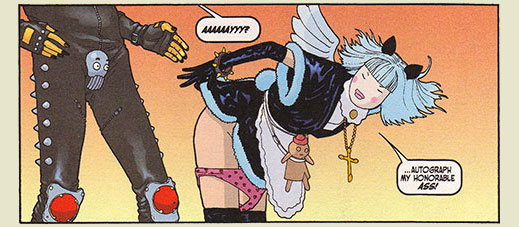
Of course it's possible that Koreans could actually, as a culture, become so distinct through hundreds of years of not being me that they, as a culture, might do all kinds of things I could never imagine. My wife, who represents (I think ably) smalltown Mid-Western America has a way of looking at the world that is wholly unlike my own—and we're both from the same country. It shouldn't be hard for me to believe other people are so different. But simultaneously, I'm well aware that people are prone to stereotype—especially cultural practices they do not quite understand. So when reading a narrative set in foreign lands that presents a picture of a people that sits far from my own normative experience, I struggle between my distaste for stereotype and my own tendency toward ethnocentrism.
And so we arrive at Jonathan Vankin's two stories collected in Tokyo Days, Bangkok Nights.
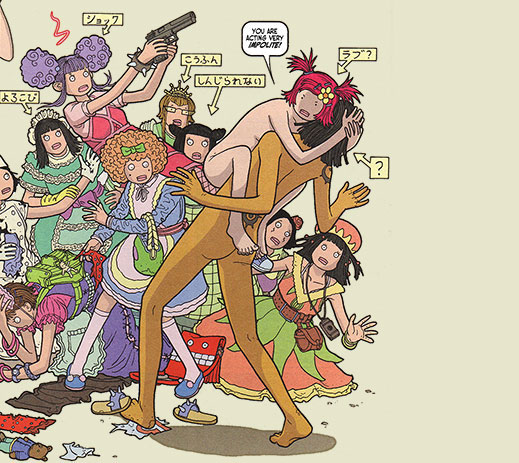
The first half, fantastically illustrated by the late Seth Fisher, is a story that follows an American Nipponophile around Tokyo in a thoroughly madcap adventure. Vankin turns the pop sensibilities of the Japanese metropolitan society to blistering levels and gives the reader an eye into nothing but the most overblown Western fantasies of what Tokyo life must really be like. Or does he? It seems impossible that even a fraction of the things, people, and events represented could come even close to reality, but (!) never having lived there, maybe I'm wrong to think these things can't be real. I mean, the picture doesn't comport to anything I've seen in manga or anime, anything I've read in Murakami or Miyabe, or anything I can imagine my Japanese-exported friends could have engaged in before moving to California.
(It's kind of like Portlandia. I've never been to Portland so who's to say for sure, but it just doesn't seem plausible to believe the show accurately represents any viable experience in the city.)
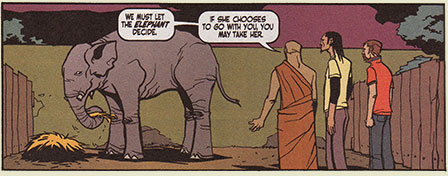
The second story, far darker in tone, capitalizes on the stereotypes of Thailand we learn from reading stories on their icky sex trade. How the cities are mob-run. How Western "tourists" make the country their destination in order to have cheap sex with thirteen-year-old girls. How prostitutes would rather get abused by men than live as nobodies back at home. This story is just as unlikely and seems ripped out of 100 Bullets, only minus Brian Azarello's obnoxiously snappy patter. It caters to all the Western fears about the terrible, dark, exotic underbelly of Asia. Surely, no city could be so wildly corrupt as Vankin's depiction of Bangkok, here. Or could it? Again, I have no real means to ascertain the story's plausibility or the veracity of the kind of portrait that Vankin's painting.
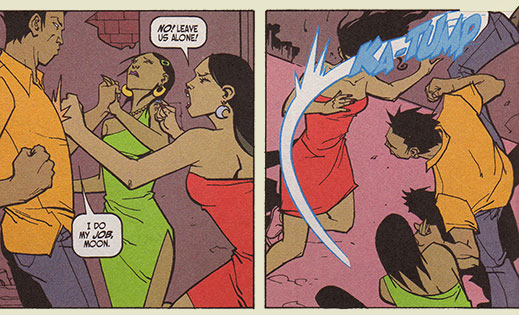
It's frustrating. I'm never quite sure what to believe—though I lean toward feeling as though the stories abused my goodwill. Maybe some thoughtful reader can enlighten me to the truth of things.
So ignoring all that (as if I could), we have two mediocre stories. Neither are particularly investing, though both focus on the part of Americans in these foreign places—and on how foreign these Americans feel in these foreign places. The Tokyo half benefits from Seth Fisher's wild visions (though Fisher's wildness may actually contribute to the untrustworthiness of the narrative). Fisher is an artist of the first class and his energetic, anal illustration gives the story a sort of Pop! that it would otherwise lack. The colours are bright and unforgiving and the pace manic. There are yakuza, boy-band J-pop stars, overly polite everybody, a lavender-haired lolicon flight-attendant hopeful, and a girl who wants to take over the world through throat-grabbing, lapel-throttling soft power. It's all a bit much and, at the same time, rather slight—since there's not really any rewarding story- or character moments.
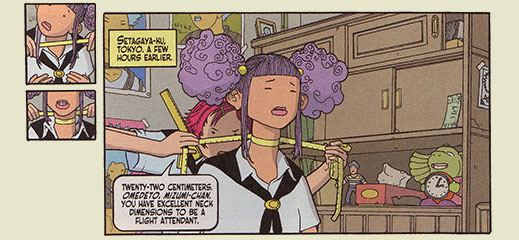
The Bangkok half is drawn/inked in a style reminiscent of Eduardo Risso's fun, noirish work on 100 Bullets, capitalizing on visual cues to illustrate the darkness of men's souls. The story's all a bit bleak and plays to all the typical Bangkok cliches. Merited or not, I felt as though I had been there and done that. (Though not literally, human rights groups!) It was an alright effort, but didn't put anything on the table to make me come back for seconds. Flipping the artists would have maybe been inspired: having Seth Fisher draw this moribund story with his buoyant flair would have been subversive to the utmost and might have made this better worth my time.
All told, Tokyo Days, Bangkok Nights struggles but never quite gets out from under the weight of my discomfort with the way the book tells its stories. My fault? Maybe, but I can't help who I am. Your mileage may, of course, vary substantially.
Good Ok Bad features reviews of comics, graphic novels, manga, et cetera using a rare and auspicious three-star rating system. Point systems are notoriously fiddly, so here it's been pared down to three simple possibilities:
3 Stars = Good
2 Stars = Ok
1 Star = Bad
I am Seth T. Hahne and these are my reviews.
Browse Reviews By
Other Features
- Best Books of the Year:
- Top 50 of 2024
- Top 50 of 2023
- Top 100 of 2020-22
- Top 75 of 2019
- Top 50 of 2018
- Top 75 of 2017
- Top 75 of 2016
- Top 75 of 2015
- Top 75 of 2014
- Top 35 of 2013
- Top 25 of 2012
- Top 10 of 2011
- Popular Sections:
- All-Time Top 500
- All the Boardgames I've Played
- All the Anime Series I've Seen
- All the Animated Films I've Seen
- Top 75 by Female Creators
- Kids Recommendations
- What I Read: A Reading Log
- Other Features:
- Bookclub Study Guides









